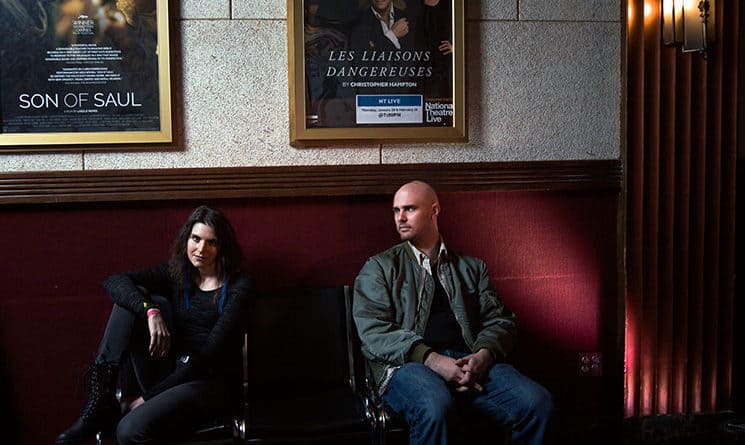Annie Baker’s 2013 play “The Flick,” now on stage at The Players’ Ring in Portsmouth, is a puzzling work frayed by the pull, or perhaps just the loose weave, of its contradictions. It is intimate in scope, yet bloated and overlong; it is idiosyncratic, yet buttressed by dramatic convention; its political sympathies are admirable, or at least current, but it has no argument; it is sporadically funny but ultimately bleak; and it is by turns mesmerizing and soporific.
The family that walked out of the theater before the end of the first act during a recent performance saved themselves from tedium, yes, but they also denied themselves moments of transcendence. Nevertheless, walking out on “The Flick” during its initial run in New York became something of a rite, a protest against the show’s perceived banality and indulgence; that it was awarded the Pulitzer Prize in 2014 reveals the sharp divide in opinion about the play’s merits. The play’s challenges, as well as its vexed reputation, provide yet more evidence of the gutsiness of The Players’ Ring. The question might be, to what end? Who is the audience for this strange, ungraspable play?
“The Flick,” directed by Todd Hunter, is about Avery (Versee Damien) and Sam (Ben Tylka), two ushers at an old-school single-screen movie theater called The Flick in Worcester, Mass., and the projectionist, an independent and spirited young woman named Rose (Emily Karel). Sam, in his mid-30s and the oldest of the three, has worked at The Flick the longest and feels entitled to a promotion, even if only to Rose’s level. Avery, who has just started at the theater while taking time off from college, is an interloper, the son of a linguistics professor who has the privilege of taking this job simply because he loves movies, and film — that is, the tangible medium — especially. For Avery, movies offer the sense of community and connectedness that he is unable to find in his family or social life. Rose is impulsive and flirtatious, more interested in movies than Sam, but less devoted to film than Avery, even though The Flick’s transition to digital could imperil her job. Rose’s experience of the world is mediated through her sexuality and her provocations; the glass behind which she works in the booth is not so different from the screen she puts up to protect herself from the world.
The play takes place amid the clutter and hinge-bottomed seats of the theater. One day follows the other as Sam teaches Avery the skills and customs of the job in short, elliptical scenes. One might be reminded of Sartre’s hell, in which the perfidies and quarrels of the dead are rehashed endlessly in a single room. “The Flick” is not nearly as despairing or bilious as “No Exit,” but the cramped theater does seem to describe the reassuring limits of Sam’s and Rose’s lives. Although Sam spends one weekend away — an event that precipitates an awkward, pivotal, and ultimately clichéd encounter between Avery and Rose — we sense that he is almost relieved to return to the theater, safe again from the hypocrisy and flippancy of the larger world.
In summary, the show hardly sounds taxing. But Baker has rendered the drama in an arch, hyper-naturalistic style in which dialogue is marked more by its distinctive pauses than by any particular or sustained eloquence, and inflection is compressed by the characters’ unmodulated delivery. In Chekhov’s plays, pauses represent the work of forcing language to come — of summoning the right words, or any words, to convey a feeling that might be embarrassing in its sentimentality or intensity. They are sites of conflict and thus highly dramatic. It is not clear how similar pauses function in “The Flick,” although they often seem to signify the process of hearing and connecting, of situating another’s perspective in the jigsaw schema of one’s own consciousness. Whatever they mean, they slow “The Flick” to a grinding, tectonic pace, and what begins as disarming and compelling comes to feel mechanical and contrived.
The performers persevere, however, bringing as much richness and subtlety to their characterizations as the script allows. Karel especially seems to gain strength as the show goes on, shedding the stiffness and inhibition of her early scenes and opening herself gradually to her character’s vulnerabilities. Her final scenes are tremendously satisfying to watch. Damien’s Avery, wide-eyed and naïve until his climactic disenchantment, is needy, sympathetic, and convincing. Baker has written some tricky lines for Avery, but Damien handles the script confidently. As Sam, Tylka most projects the play’s Chekhovian dissatisfaction. His professional ascent is stymied and has, anyway, a conspicuously low ceiling, but the world beyond The Flick seems so meaningless, unconquerable, and impenetrable that he doesn’t imagine engaging with it. Tylka might inject some fervor, some spikes of passion or anger into the role — his resignation is maddening — but one senses an absolute commitment to character in his performance.
Still, it is unclear who the performance is for. The show is rigorous, melancholy, long, and yet, somehow, unsatisfying. Although it suggests compelling dialectics — the characters are particularly preoccupied with the artificial versus the authentic, as manifested in Avery’s preference for reel-to-reel film over the abstraction of digital — it does not see them through. And who is the audience for a three-hour show in which so little happens? I don’t mean to suggest that serious theater like this should be any further marginalized — just that, perhaps, it’s live performance, not film, that needs a play written in its defense.
“The Flick,” directed by Todd Hunter, is on stage through April 10 at The Players’ Ring, 105 Marcy St., Portsmouth. For showtimes and tickets, visit playersring.org or call 603-436-8123.

